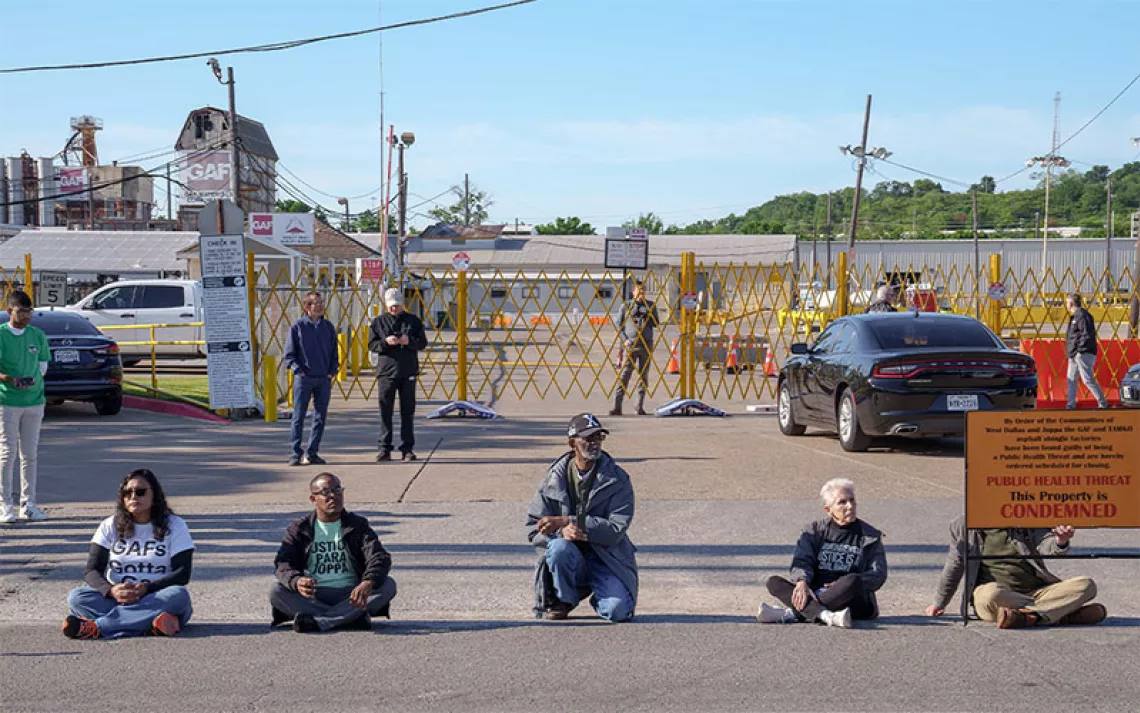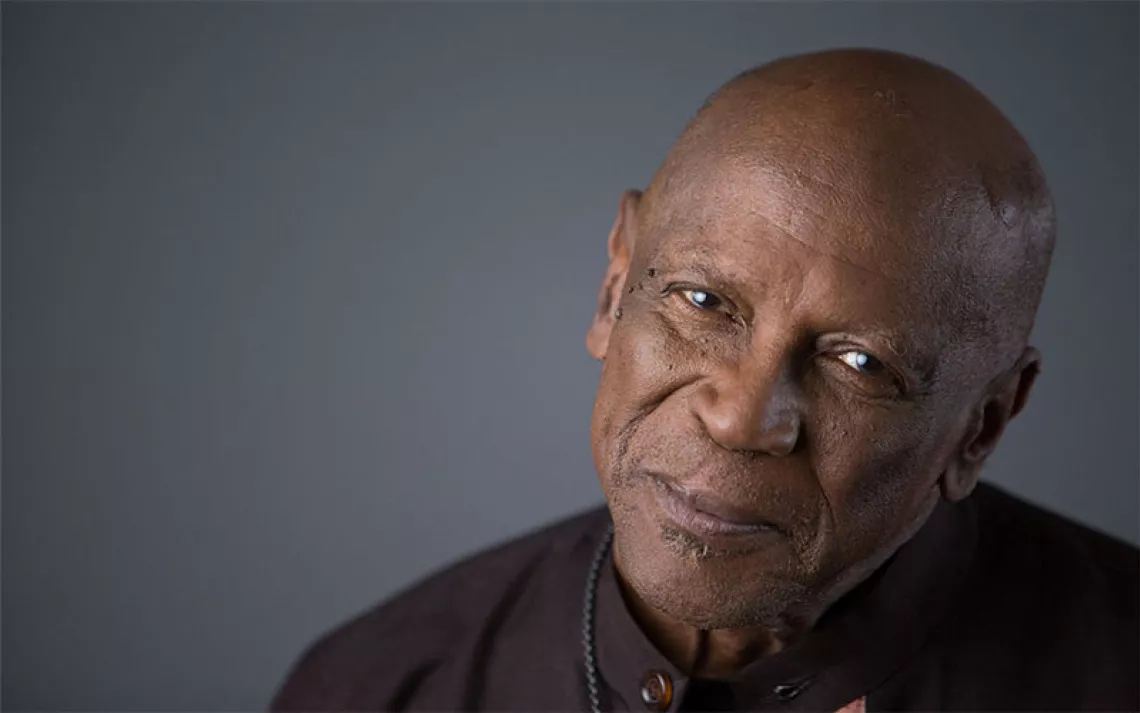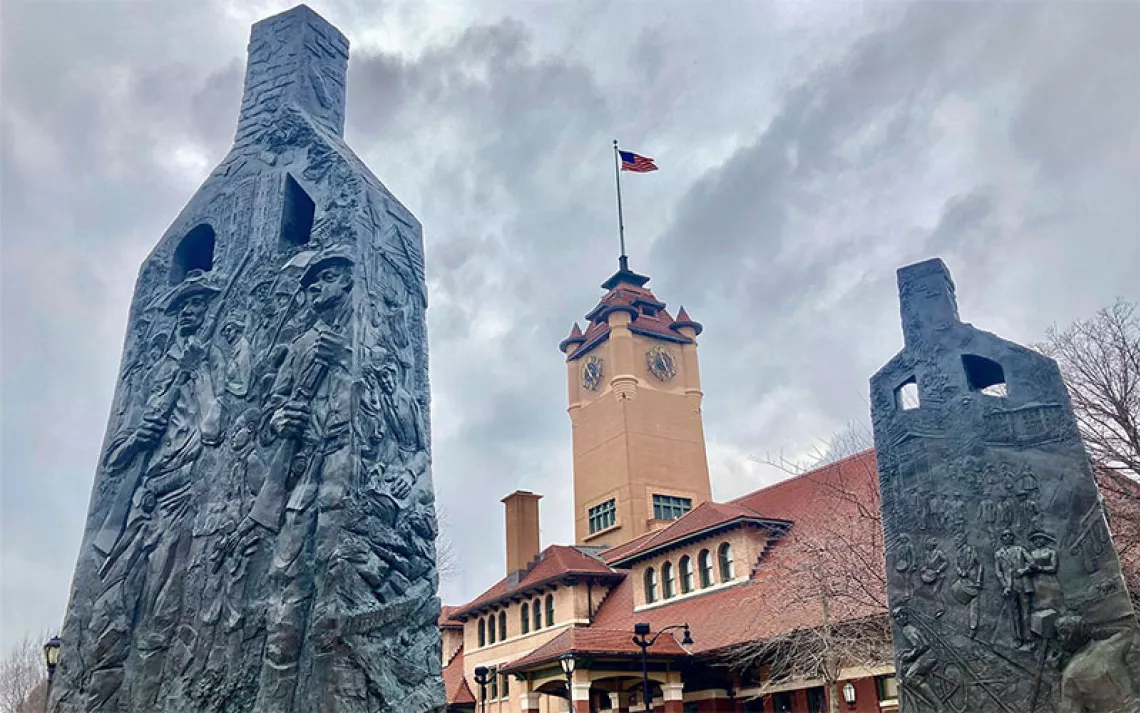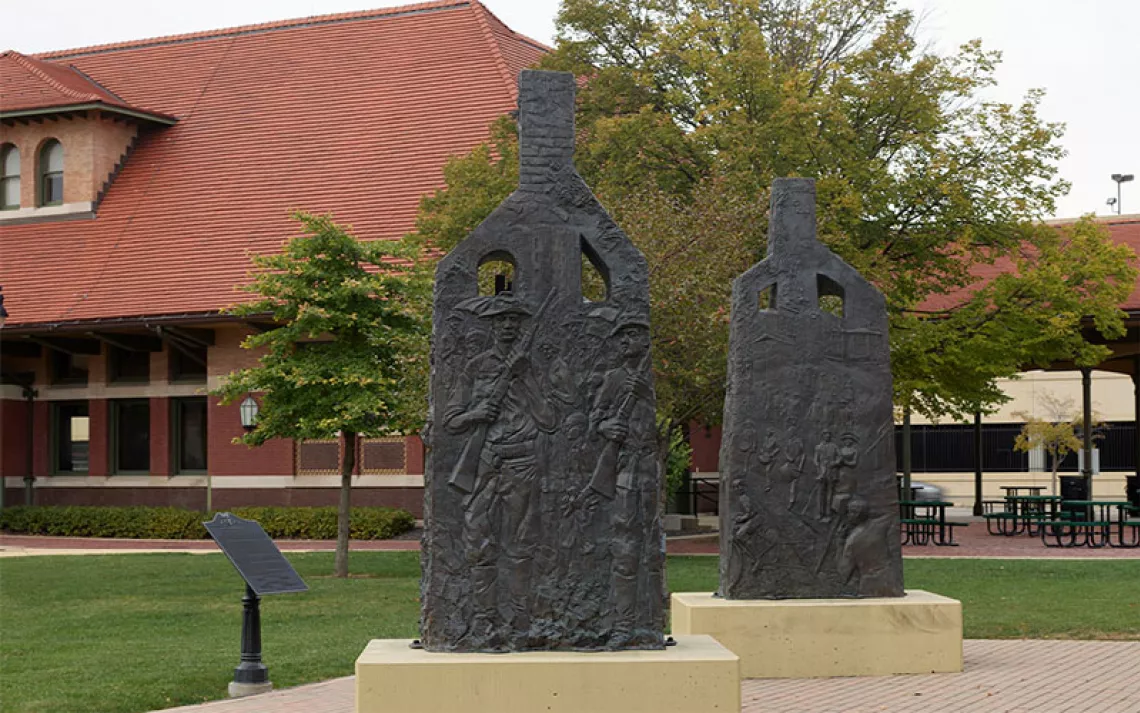Inside 2020’s Black Solidarity Hashtag Movement
How scientists and adventurers united online in the name of equity

Bucknell University botany researcher Tanisha Williams, organizer of Black Botanists Week, poses with a tulip poplar. | Photo courtesy of Tanisha Williams
This Black History Month follows a summer and fall marked by protests in response to police brutality against Black Americans and, more broadly, centuries of racial injustice. As the country grappled with its deep-rooted history of systemic racism, Black scientists and nature enthusiasts took to social media to affirm their place—and boost Black visibility—within their predominantly white fields and hobbies.
These disparities in representation didn’t happen overnight: In 2016, Black people received just 6 percent of all doctorates in life sciences and less than 3 percent of doctorates in physical and earth sciences. Latino students were awarded fewer than 8 percent of doctorates in life sciences and around 5 percent of doctorates in physical and earth sciences, according to a 2018 report from the National Science Foundation. That’s likely because Black and Latino students are more likely to drop STEM majors than their white peers, as they face more exclusion and microaggressions in the classroom—problems that Black scientists often continue to encounter once they’re working in their fields.
Recent social media movements, largely led by Black researchers, have made a point of calling attention to individual achievements and encouraging more equity within their respective professions. Here’s a timeline documenting the movement’s development and its events.
Black Birders Week
(May 31–June 5, 2020)
Prompted by the racist confrontation toward birdwatcher Christian Cooper in New York City’s Central Park last Memorial Day weekend, Black avian enthusiasts took to social media to show their solidarity. Ultimately, the BlackAFinSTEM Collective declared May 31–June 5, 2020, the inaugural Black Birders Week.
The event’s organizers—including Georgia Southern University biology graduate student Corina Newsome, podcaster and National Audubon Society government affairs coordinator Tykee James, and North Carolina State University conservation biology graduate student Deja Perkins—aimed to publicize and celebrate the work of Black nature enthusiasts and birders through livestreams and social media hashtags, including #BlackWomenWhoBird.
“For far too long, Black people in the United States have been shown that outdoor exploration activities are not for us,” said Newsome, who’s researching avian conservation, in a Twitter video, “whether it be the way the media chooses to present who is the ‘outdoorsy’ type, or the racism Black people experience when we do explore the outdoors, as we saw recently in Central Park. Well, we’ve decided to change that narrative.”
Black Botanists Week
(July 6–11, 2020)
A month later, the #BlackBotanistsWeek campaign launched on Twitter and Instagram to “promote, encourage, create a safe space for, and find more Black (and BIPOC) people who love plants.” Participants shared photos of themselves surrounded by lush greenery in both the lab and their personal gardens. Black Botanists Week also encouraged social media users to speak to the need for diverse communities within the field.
Among the founders were Bucknell University botany researcher Tanisha Williams, who told The Los Angeles Times that she brings wildflower books and botanical field guides to parks to avoid being questioned by strangers. “It’s for other people. I wouldn’t otherwise lug these books.”
On July 6, Williams used the Black Botanists Week platform to commemorate the late Lynika Strozier, a biologist who studied ancient plant DNA at the Field Museum in Chicago. Strozier died from COVID-19 complications in June 2020. When painstakingly handling old and fragile plant samples, Matt von Konrat told The New York Times, the museum’s head of botanical collections, she had “golden hands.”
The impact of Black Botanists Week extends far beyond this past summer: In October, its founders partnered with Ohio’s Holden Forests and Gardens to create a yearlong lecture series, "Growing Black Roots: The Black Botanical Legacy,” which features a new speaker each month.
Black In Neuro Week
(July 27–Aug 2, 2020)
Nervous-system researchers also embraced the online movement: A team of neuroscientists, neuroengineers, and science communicators organized #BlackInNeuroWeek, “a social media initiative aimed at celebrating, amplifying, and supporting Black voices in STEM.”
The week’s schedule included a panel on racism within the field, which delved into critiques of scientific and technological advancements that harm the Black community; recently, critics have denounced the racist outcomes of predictive policing algorithms.
Lead organizer Angeline Dukes, a graduate student researcher at the University of California Irvine in the Department of Neurobiology and Behavior, said that Black In Neuro Week also aimed to reach burgeoning scientists.
"I hope that some Black K–12 students and undergraduates see us doing science and are inspired by it,” Dukes said. “I hope they realize that if they want to, they can do it too and, we will be here cheering them on every step of the way."
#ShareTheMedicalMic
(July 22, 2020)
The Instagram campaign #ShareTheMedicalMic trailed soon after, with the goal of highlighting Black women in the medical field. On July 22, 40 Black women took over the Instagram accounts of non-Black female physicians to host livestream conversations about prejudices they face as both health care providers and patients. For example, Black women are three times more likely to die of pregnancy-related causes than white women; this disparity occurs in part due to doctors’ implicit biases toward people of color.
The event’s cofounders—Renée Paro, a pediatric cardiologist from Dublin, California, and Lauren Powell, a family physician from Atlanta—were influenced by the women-led #ShareTheMicNow initiative, which invited Black activists and academics to magnify their work on white celebrities’ Instagrams.
“A lightbulb went on for me,” Powell told USA Today. “It's one thing for me as a Black female to have these conversations (about race) with other Black females. But we create change by having these conversations with people that don't look like us.”
Black in Geoscience Week
(September 6–12, 2020)
A group of Black geoscientists kicked off #BlackInGeoscienceWeek this fall and, in true geoscience fashion, themed the events according to earth systems. Live discussions centered around topics like decolonizing geoscience and the barriers to entry in atmospheric research jobs. Black people are particularly underrepresented in this field, composing a mere 3 percent of all environmental scientists and geoscientists. In fact, very little has changed in the past four decades.
That’s why Black in Geoscience Week co-organizer Hendratta Ali, a geologist at Fort Hays State University in Kansas, created a petition demanding a “robust anti-racist action plan” from professional geoscientist societies and organizations.
“Those of us—especially white and otherwise privileged geoscientists—who have been mostly silent must take advantage of the following action plan to engage in meaningful anti-racism and not be complicit in racism, discrimination, and inaction any longer,” Ali wrote.
Black in Marine Science Week
(November 29–December 5, 2020)
This hashtag-powered campaign uplifted the work of Black marine scientists who (literally) dive deep into their research. Tiara Moore, an environmental ecologist who studies ecosystem biodiversity, told PADI that she founded Black in Marine Science Week because “the lack of diversity in marine science matched with the global civil unrest caused by the murders of Black people sparked an initiative to show Black people excelling and not to be seen as predators.”
In one of the week’s highlights, Moore spoke with marine biologist and writer Ayana Elizabeth Johnson about what marine science means to them. Discussions also covered the challenges of diving while Black—Moore said masks have significantly damaged her natural hair. Black marine scientists also contend with harmful myths that stem from the realities of segregation. "Because there is this global stereotype that Black people don’t swim, in the marine world I’m seen as not belonging,” Moore said.
 The Magazine of The Sierra Club
The Magazine of The Sierra Club



